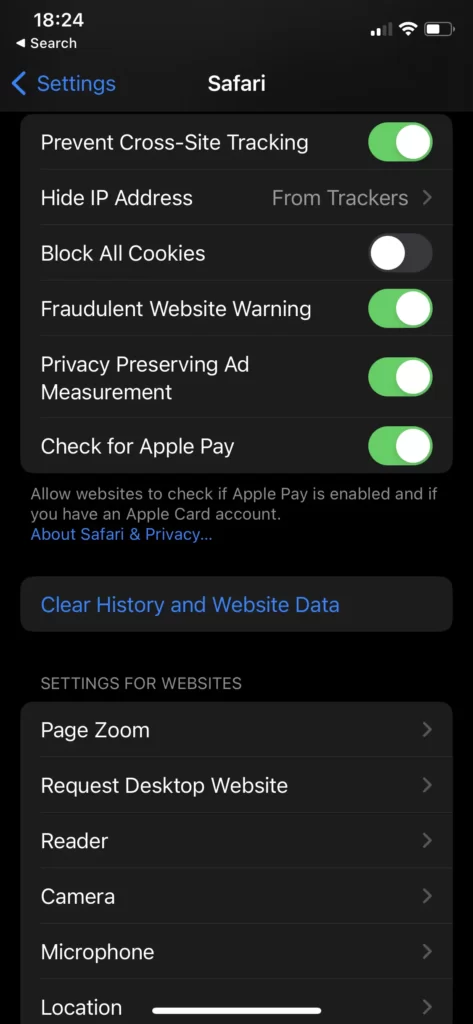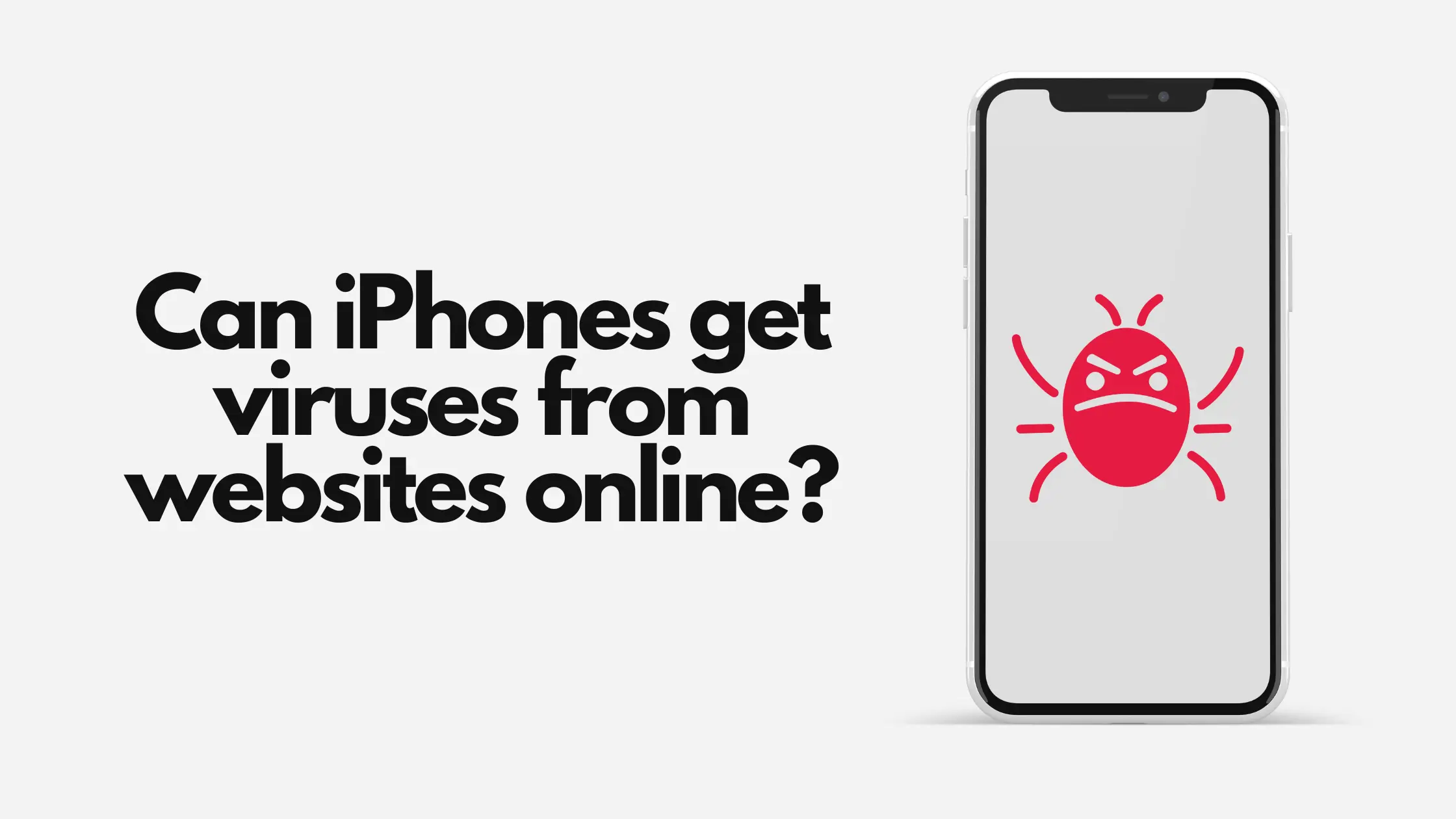Can iPhones get viruses from websites online?
The chances of an iPhone catching a virus from a website online are very low, but it can happen. This depends on your actions online and how cautious you are while surfing. While browsing, links that contain malware are made to look very attractive. This is because they’re designed to attract attention and be clickable. You should avoid suspicious links, ads and suspicious websites if you don’t want to catch a virus.
Even on websites you’ve visited before, you may come across a link that can develop malware on your iPhone. That’s why Apple doesn’t allow downloading content from the web. It’s the place where you can catch various viruses. In theory, it is not possible to catch a virus on an iPhone. But, in practice, it’s there are cases when this happened. How is it possible?
You could catch malware or virus on infected websites. At one time scams through social platforms like Whatsapp and Viber were popular. You may have received a suspicious link from a friend. However, since it’s a close friend, you access the given link. In the end, it turned out that it was actually a virus. By clicking on the link you were redirected to the browser window where the virus or malware was stored. And the same link was forwarded to your contacts. This can happen even without the mediation of social networks if you simply access an infected link. So, be careful what you click on and which websites you visit.
Secure Apple’s operating system is very attractive to hackers. They find alternative ways to release viruses. Research shows that you can detect only a small percentage of viruses on iOS because there isn’t more. This operating system secures your data better than Android. Although the chance of infection is minimal, it’s still possible. The iPhone operating system is not completely resilient. The best way to protect your iPhone is to update it and be aware of your actions.
How do I know if there’s a virus on my iPhone?
Although it’s unlikely that your iPhone will catch a virus, it can still happen if you don’t pay attention to your online behavior. If you are wondering can iPhones get viruses from websites online, here are some signs that may refer to an virus infection on your iPhone:
- Jailbreak – You wanted to install an app that is not available on the App Store? Great for your curiosity! But, there is a possibility that your iPhone caught a “worm” during the jailbreak. It disrupts the functioning of the device. In that case, you need to delete the suspicious app.
- Unknown applications – If you notice some unknown apps on your device, there might be a problem. If you don’t remember installing them, there is a chance that your iPhone has caught an infection.
- Pop-ups – If you see a lot of intrusive pop-ups on your browser, it could be a sign of a virus. If something like this happens, be sure to close the window in your browser.
- Cellular data usage – A sudden increase in mobile data usage can also be a sign of malware. It may happen that the virus has exceeded your usage limit.
- iPhone temperature – If your iPhone overheats, there is a chance that it is due to a virus infection. Background malware can load your device and overheat it.
- The battery – Complex and powerful applications can lead to rapid battery drain. So, if malware is running in the background, it could be the reason for battery issues.
How to check for viruses on iPhone?
To check if your iPhone has a virus, first of all, check if it has been jailbroken. You may have picked up some malware during this process. If you notice unknown apps on your device, this could also be a sign of a virus. Another way to test your iPhone for viruses is to find out if your mobile internet bill has increased. It could be related to a running app in the background. Be sure to check the storage space as well. If you have much less space than you should, the cause may be a virus infection.
Removing viruses from iphone
If you are looking for a way to remove viruses from iPhone, this is how you can do it:
- In case of persistent pop-ups, close the Safari window where the ad popped up and turn on Airplane Mode. This will prevent malicious data from flowing through your network. After that, clear the Safari history and website data and disable pop-ups.
- Make sure to delete any unusual apps that shouldn’t be on your iPhone.
- Also, you can always install some antivirus software. That’s how you can be insured and informed about possible threats.
- We have already learned that restarting the phone is a cure for many issues so you can try this technique. In some cases, it’s possible to get rid of the malware by restarting an iPhone
- If you’ve tried all methods, and the virus is still present, consider replacing the device.
How do I get rid of the Safari virus on my iPhone?
Persistent pop-ups are not only annoying, they can be a big red flag and show the presence of a virus. In this case, make sure to close the Safari window where the pop-up appeared and then enable Airplane Mode.
To get rid of the virus, you can always try restarting your iPhone first. Also, updating your iOS system can sometimes solve the problem. If none of this helps, you can try to remove the Safari virus as follows:
- Go into the Safari section on your iPhone
- Tap on the option Clear History and Website Data

Also, uninstall any apps that you don’t remember downloading or that shouldn’t be there. Sometimes the best option is to factory reset your iphone.
What if I clicked on a phishing link on my phone?
Even though IT terminology is no longer so foreign to us, many are still confused by certain terms. That’s why they are unable to recognize potential online threats. To know how to avoid phishing links, you first need to know what they are.
Phishing links are part of cyber scams and are deceptive emails. Such links can appear so credible that you believe that the email came from a friend or a company you work with. Cyber frauds have become so common because they are challenging to detect nowadays.
But what happens if you click on a phishing link? With one simple click on such a link, there is a high probability that your device will catch a virus. Once this happens, hackers can gain access to your device. They’re able to send a phishing link to your contacts. Worst of all, they have access to all your confidential information stored on your device. So, only one click can lead to a complete disaster. What is most bizarre of all, while all this is happening, you have no idea about it.
What to do if you click on a phishing link on iPhone
- First, disconnect your iPhone from the internet. This prevents the further spread of malware to other devices through your network. It also prevents the spread of your sensitive information. If you disconnect your iPhone, hackers won’t be able to access your device, too.
- After turning off the internet, be sure to back up your files. In this way, it protects confidential data and information located on your device.
- Scan the system and thus the malware. The best option is to contact a professional who will help you solve the virus and recover your device.
- Be sure to change your online confidential credentials. Your passwords, credit card, and bank account numbers can be exposed. So, be sure to change them immediately so that the hacker cannot use them.
- Also, consider setting up a fraud alert. You can choose one of the credit bureaus to help you place a fraud alert on your credit report.
How to know if my iPhone is hacked?
Take care of the behavior of your iPhone and from time to time pay attention to the content that is on the device. If you notice anything unusual, it could be a sign that your iPhone has been hacked. These are some of the signals that may show cybercrime:
- If your battery doesn’t last as long as it used to, something is going on in the background of your iPhone. This can be one of the signs that your device has been hacked.
- If you generally don’t use up all your mobile data in a month, but you’ve exceeded your usage limit, it might be hacking. Especially if you haven’t used the mobile internet more than usual.
- You may experience strange behavior from your iPhone. This doesn’t have to mean it’s hacked. But, it’s one more reason to check and thus prevent possible damage.
- If you notice some new apps that you’re sure you didn’t install, your phone is jailbroken and hacked. Jailbreaking an iPhone requires physical access, so be careful about who can use it. Also, a professional hacker can hack and still find a way to hide suspicious applications.
- Background noises can also refer to something unusual going on with your iPhone. You must’ve experienced strange noises during the conversation and it may mean that it’s a bug. At the end of the day, a mobile device is a machine and it’s not perfect. But, sounds such as clicks, static, and echoing noises can show that the iPhone has been hacked. So, maybe someone is tracking your calls.
It’s important to emphasize that these signs don’t need to allude to hacker activities, but they are a red flag. So, it’s recommended that you check what it is about.
Can iPhones get viruses from email?
Suspicious emails can also be one of the ways you can get infected with a virus. Email scams have been very common in the last few years. This way of spreading malware has become so sophisticated that you can no longer tell if an email is fake or not. Sometimes it looks like you’ve received an email from someone you know, but it’s a complete scam. Such emails usually contain phishing links. By clicking on them, your device develops malware.
Can iPads get viruses?
Your iPad can develop malware via email or when downloading apps that are not coming from App Store. Avoid clicking links in emails, pop-ups, or downloading suspicious applications. Apple’s operating system is ahead of the others, and that’s one of the reasons why is so popular. Nowadays, everyone wants security, especially since everything is possible with a few clicks. Yet, by choosing iOS you cannot be 100% secure and know that you will never be able to catch a virus.
Conclusion
Modern technology has brought us many benefits. But, it’s important to be aware of its negative sides. Ever since the internet existed, we have been familiar with the term virus. Nowadays, there may be easier ways to get rid of them. But, the viruses themselves can be much more persistent and complex. iOS is definitely the best operative system. Yet, no one guarantees that your device cannot develop some malicious software. In that situation, you must know how it can happen and the most important steps you can take. Of course, if it is a cyber fraud, make sure to contact an IT expert. If anyone can solve this kind of problem, the professionals can. It’s important that you take care of your device for your own safety. So, experience your iPhone as a living entity and take care of its “health”.




